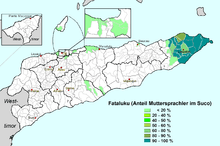Fataluku language
Fataluku (also known as Dagaga, Dagoda', Dagada) is a non-Austronesian language spoken by approximately 37,000 people of Fataluku ethnicity in the eastern areas of East Timor, especially around Lospalos. It is a member of the Timor-Alor-Pantar language family, which includes languages spoken both in East Timor and nearby regions of Indonesia.[3] Fataluku's closest relative is Oirata,[4] spoken on Kisar island, in the Moluccas of Indonesia.[5] Fataluku is given the status of a national language under the constitution. Speakers of Fataluku normally have a command of Tetum and/or Indonesian.[6]
| Fataluku | |
|---|---|
| Region | Eastern East Timor |
Native speakers | 37,000 (2010 census)[1] regional usage |
Trans–New Guinea ?
| |
| Language codes | |
| ISO 639-3 | ddg |
| Glottolog | fata1247[2] |
 Distribution of Fataluku in East Timor | |
Phonology
Vowels
| Front | Central | Back | |
|---|---|---|---|
| Close | i /i/ | u /u/ | |
| Mid | e /e/ | o /o/ | |
| Open | a /a/ |
Consonants
| Bilabial | Labiodental | Coronal | Palatal | Velar | Glottal | ||
|---|---|---|---|---|---|---|---|
| Nasals | m /m/ | n /n/ | |||||
| Plosive | p /p/ | t /t/ | k /k/ | ' /ʔ/ | |||
| Affricates | voiceless | c /t͡ʃ/¹ | |||||
| voiced | j /d͡ʒ/ | ||||||
| Fricatives | voiceless | f /f/ | s /s/ | h /h/ | |||
| voiced | v /β/² | v /v/² | z /z/ | ||||
| Flap | v /ⱱ/² | r /ɾ/ | |||||
| Lateral | l /l/ | ||||||
| Semivowel | v /w/² | ||||||
- ¹ Spelled <tj> in Nácher orthography.
- ² Pronunciation of <v> varies in dialects.
Words and phrases
The letter 'c' and the letter combination 'tx' are pronounced as 'ch'.
Rau ana kapare? / e nicha rau rau / maice ana umpe? "how are you?" Rau "good" Kapare "not good" Hó "yes" Xaparau "thank you" Tali even xaparau "thank you very much" nitawane "you're welcome" Favoruni "please" itu nae tini "excuse me" Ó lai'i "hello" mua toto, ia toto,purupale " take care" Kois ta niat ali fanuhene "see you later" Pronoun Possessive pronoun I : Aniri/Ana My: Ahani You : Eri (singular), Iri (plural) Your: Eheni(sing), Eheniere (plur) We : Iniri (excl), Afiri (inclusive) Our: Inihini (exc), Afihini: (incl) They : Tawari, Márafuri Their: Their Tavarhini, Marafurhini He/She : Tavai, marí, mármocoi His/Her: Tavahini, Marmokoihini It : Iví Its: Ivihini, Tavahini
gollark: AEONS DO THAT.
gollark: ```You want: Pink/Red/other BSA hatchlings```I got an offer of a 6d single Pink egg.
gollark: *or at least the hatchlings*
gollark: *kind of also wants them*
gollark: *good?????*
See also
Notes
- Fataluku at Ethnologue (18th ed., 2015)
- Hammarström, Harald; Forkel, Robert; Haspelmath, Martin, eds. (2017). "Fataluku". Glottolog 3.0. Jena, Germany: Max Planck Institute for the Science of Human History.
- Heston (2015), p. 3
- Usher, Timothy, "Fataluku", newguineaworld, archived from the original on 2020-03-05
- Heston (2015), p. 6
- Heston (2015), p. 5
References
- Nácher Lluesa, Alfonso María; Fidalgo Castro, Alberto; Legaspi Bouza, Efrén; Delgado Rosa, Frederico; Hull, Geoffrey Stephen (2012). Léxico Fataluco-Português (PDF). Dili: Salesianos de Dom Bosco Timor-Leste. hdl:2183/9927. ISBN 978-84-695-4633-8.
- Heston, Tyler M. (2015). The segmental and suprasegmental phonology of Fataluku (PDF) (Doctor of Philosophy thesis). University of Hawai'i at Mānoa. hdl:10125/51090.
- Conceição Savio, Edegar da (2016). Studi sosioliguistik bahasa Fataluku di Lautém [Sociolinguistic study of the Fataluku language in Lautém] (Doctoral thesis) (in Indonesian). Leiden University. hdl:1887/37552.
External links
| Fataluku language test of Wikipedia at Wikimedia Incubator |
- Fataluku Language Project
- Fataluku language website
- Fataluku community and language with Fataluku/English and English/Fataluku wordlists
- Fataluku wordlist at the Austronesian Basic Vocabulary Database
- Materials on Fataluku are included in the open access Arthur Capell collection. (AC2) held by Paradisec.
- Songs in Fataluku are included in the Ros Dunlop collection held by Paradisec.
This article is issued from Wikipedia. The text is licensed under Creative Commons - Attribution - Sharealike. Additional terms may apply for the media files.